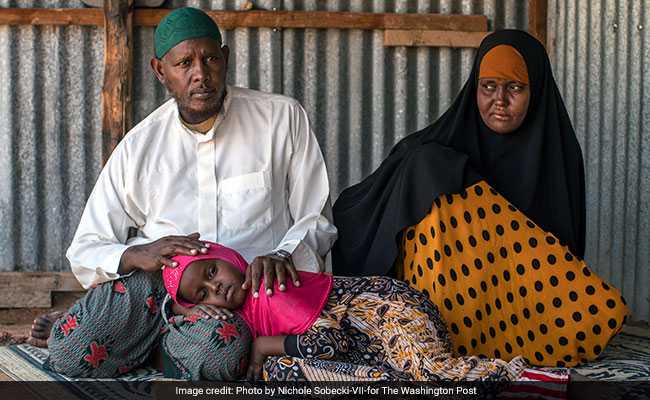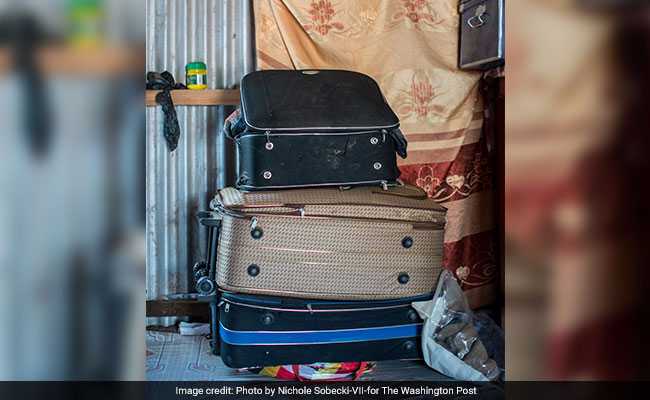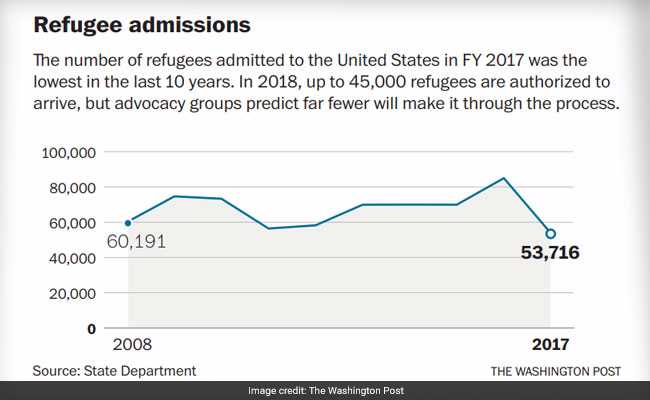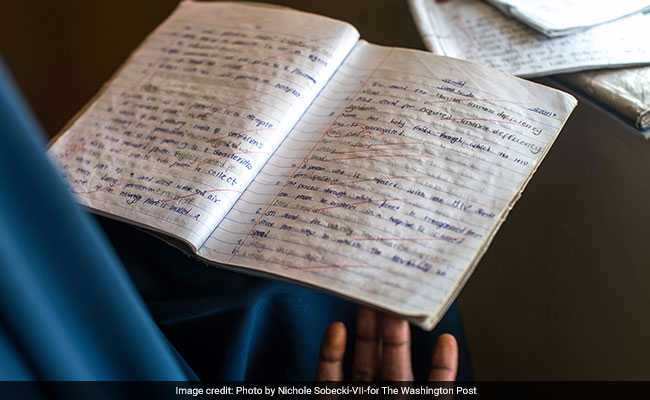
5-year-old Nimo Salan waits in her home in the Dadaab refugee camp in Kenya
Dadaab Refugee Camp, Kenya:
The doctors told Timiro Hassan that her daughter could survive. The kidney cancer could be treated.
Even though the United Nations couldn't pay for it, even though the chemotherapy wasn't available here, there was one option that for decades had saved the lives of Somali refugees in need of medical care. Five-year-old Nimo Salan could be resettled in America.
"Level: Emergency," U.N. officials wrote on her file.
"If she doesn't get resettled, she'll die," said one of her doctors, Aden Hassan Abdi, the clinical service coordinator with the Islamic Relief aid group.
But Hassan ran into the same hurdle as hundreds of refugees with urgent medical conditions: the Trump administration's new security restrictions. There are now 11 countries facing a broad suspension from the U.S. refugee program. Even people with potentially deadly - yet treatable - illnesses are being blocked. Some refugees with severe medical conditions have already died while waiting for the admissions to resume, advocates say.
The United States has been a global leader in resettling refugees since the aftermath of World War II, when it accepted more than a half-million displaced Europeans. But the White House says the new pause is necessary to improve vetting procedures for people from high-risk countries such as Somalia, where an Islamist extremist group, al-Shabab, is battling the government.
U.S. authorities say they will consider exceptions on a case-by-case basis. People who work at this camp of 250,000 refugees say, however, that they have seen none approved since late October.
"The U.S. always recognized that resettlement was a humanitarian program - that it saved people's lives. These changes have been devastating," said Sasha Chanoff, the founder of RefugePoint, a nonprofit group that refers urgent cases to the State Department for resettlement.
Nimo was born in this sprawling refugee camp, but her parents fled Somalia in 1992, making her subject to the suspension, which was quietly announced by the State Department in October. Even though refugees were not included in the "travel ban" that the U.S. Supreme Court recently allowed to take effect, their cases have largely been frozen through at least January, and possibly longer.
 When she was 3, Nimo was diagnosed with Wilms' tumor, a cancer of the kidney. A malignant growth bulged from her tiny belly. In her family's hut in this vast refugee camp, her mother poured cold water on her feverish body, not sure what else to do.
When she was 3, Nimo was diagnosed with Wilms' tumor, a cancer of the kidney. A malignant growth bulged from her tiny belly. In her family's hut in this vast refugee camp, her mother poured cold water on her feverish body, not sure what else to do.
Last year, Nimo was taken to Nairobi, where one of her kidneys was removed and she received a round of chemotherapy, enough to save her life - at least temporarily. But more radiation therapy would be needed to eradicate the cancer and keep her alive. U.N. refugee officials consulted the National Council of Churches of Kenya, which sometimes funds medical treatment for people in the camp.
"Not ready to approve this due to cost," wrote a doctor with the council in an email to the United Nations in September.
That made resettlement in America Nimo's only option. Her family was already in the pipeline to be moved to the United States - along with 14,000 other residents of this camp. But with Nimo's condition worsening, they needed to expedite the case. With the Trump administration's restrictions, that has not been possible.
"We tried," said Catherina Funck, a resettlement caseworker with the U.N. High Commissioner for Refugees in Dadaab. "The cases just aren't moving."
Not a single Somali refugee from Dadaab has been resettled in the United States since late October, refugee officials say. On Abdi's desk, the number of medical emergencies is growing. He keeps the cases in a bulging blue binder labeled, "Resettlement."
 Last month, one of the children who had been waiting for his flight to America - a 3-year-old boy with a treatable congenital heart condition - died, Abdi said. More than 50 other cases have been designated as life-threatening.
Last month, one of the children who had been waiting for his flight to America - a 3-year-old boy with a treatable congenital heart condition - died, Abdi said. More than 50 other cases have been designated as life-threatening.
"For so many of them, without resettlement, it's a death sentence," Abdi said. "Trump's policy is like a bomb that exploded here."
---
For now, Nimo is still relatively healthy. She traces the scar where her kidney was removed and asks her mother in a squeaky voice, "What happened here?"
But doctors expect her condition to deteriorate in coming weeks and months.
"I know she'll die if we can't get help," her mother said.
Since President Trump's first travel ban was introduced in January, suspending refugee admissions and arrivals from seven mostly Muslim countries, the resettlement of Somali refugees has been nearly paralyzed. Eventually, the White House removed the stipulation about refugees from its executive order, enforcing the ban instead on visa applicants.
But in an October memo, the State Department and the Department of Homeland Security said they still needed to conduct "a detailed threat analysis and review for nationals of these high risk countries," referring to 11 nations, including Somalia. People from those countries would largely be blocked from the refugee program for at least three months.
 "What will the 90-day reexamination yield? Right now we don't know," said one U.S. official, who spoke on the condition of anonymity under his department's ground rules.
"What will the 90-day reexamination yield? Right now we don't know," said one U.S. official, who spoke on the condition of anonymity under his department's ground rules.
Refugees were already subject to intensive U.S. screening that involves eight federal agencies, six security databases, five background checks and several biometric security checks.
The State Department said in a statement that it could not comment on individual cases like Nimo's because of privacy concerns, but that in refugee admissions, "the safety and security of the American people is paramount." The department said it could allow refugees with urgent conditions into the United States while the government reviews its vetting procedures.
"We continue to receive referrals from UNHCR for vulnerable cases - for example, urban refugees, single mothers, vulnerable women, and people with medical conditions," the U.S. official said. "Processing times may be slower because of new security vetting procedures."
But officials working for the United Nations and nonprofit groups that partner with the State Department on refugee admissions said they were not aware of any exceptions made for Somali refugees.
"The biggest tragedy is that a lot of people aren't going to make it in time," Chanoff said.
On Saturday, a federal judge in Seattle partially lifted the suspension, ordering that refugees with relatives in the United States should be processed so that their families could be reunited. The court order probably would not improve the odds of resettlement for most refugees with urgent medical conditions.
 Across Kenya, there are dozens of urgent refugee medical cases on hold. One involves a Somali 12-year-old named Samira Abdullahi, who is bedridden on the second floor of a Nairobi apartment, with a life-threatening congenital heart condition. In her medical file, a doctor working with the United Nations described the treatment that might help her. "This is not currently available locally," he wrote.
Across Kenya, there are dozens of urgent refugee medical cases on hold. One involves a Somali 12-year-old named Samira Abdullahi, who is bedridden on the second floor of a Nairobi apartment, with a life-threatening congenital heart condition. In her medical file, a doctor working with the United Nations described the treatment that might help her. "This is not currently available locally," he wrote.
"We are watching her health deteriorate," said Hawa Wario, a social worker assigned to her.
The ban has also affected refugees in other countries, including Yazidi women who fled their Islamic State captors in Iraq, victims of violence in Sudan's Darfur region and Iranian dissidents.
The consequences of the White House's refugee policy are already clear in data released by the State Department. Although the U.S. government allotted 45,000 slots for refugees from October 2017 to October 2018, it is receiving far fewer than that. Between October and Dec. 10, it had resettled only 3,553. If that pace continued, the United States would only accept about 17,000 refugees during the fiscal year. That would be the lowest refugee admission since 1980.
---
Hassan and her daughter Nimo are known here by their official designations: Refugee #28914 and Refugee #450349, respectively. The mother had come to Kenya from Somalia in 1992, as violence enveloped the country. She expected to stay for a few months, but the war deepened. With Nimo's cancer, a return to Somalia became even less realistic. There would be no chance of treatment there.
From an Internet cafe in the refugee camp, Hassan sent emails to the State Department explaining her daughter's case. The responses trickled back.
One read: "Certain limited exceptions where in the national interest and when admission of the applicant would not pose a risk to U.S. security or welfare will be considered on a case-by-case basis."
Hassan looked at her daughter. :
"How could she be a security threat?" she asked a visitor.
The United States is among the few countries in the world that gives priority to refugees with urgent medical conditions. In October, U.N. officials looked for other resettlement options for Nimo. Canada and Sweden sometimes accept urgent cases, albeit in very small numbers.
The slots available "were already exhausted for 2017," Funck said.
One morning this month, Nimo sat on the ground outside her family's hut, drawing flowers and stars in the sand with her finger. Inside were all the bags her parents had purchased, convinced that their flight to America could be scheduled any day.
At night, Nimo slept under a mosquito net outside, where it was cooler than in the corrugated metal hut. Her parents listened to the radio, hoping there would be news about Trump's refugee policy.
Abdi, her doctor, was also waiting for news that might offer her a chance.
Inside his office, with her file opened in front of him, he sighed.
"Previously, there was hope. Now there's none," he said. And then he paused.
"The sick live on hope."
(This story has not been edited by NDTV staff and is auto-generated from a syndicated feed.)
Even though the United Nations couldn't pay for it, even though the chemotherapy wasn't available here, there was one option that for decades had saved the lives of Somali refugees in need of medical care. Five-year-old Nimo Salan could be resettled in America.
"Level: Emergency," U.N. officials wrote on her file.
"If she doesn't get resettled, she'll die," said one of her doctors, Aden Hassan Abdi, the clinical service coordinator with the Islamic Relief aid group.
But Hassan ran into the same hurdle as hundreds of refugees with urgent medical conditions: the Trump administration's new security restrictions. There are now 11 countries facing a broad suspension from the U.S. refugee program. Even people with potentially deadly - yet treatable - illnesses are being blocked. Some refugees with severe medical conditions have already died while waiting for the admissions to resume, advocates say.
The United States has been a global leader in resettling refugees since the aftermath of World War II, when it accepted more than a half-million displaced Europeans. But the White House says the new pause is necessary to improve vetting procedures for people from high-risk countries such as Somalia, where an Islamist extremist group, al-Shabab, is battling the government.
U.S. authorities say they will consider exceptions on a case-by-case basis. People who work at this camp of 250,000 refugees say, however, that they have seen none approved since late October.
"The U.S. always recognized that resettlement was a humanitarian program - that it saved people's lives. These changes have been devastating," said Sasha Chanoff, the founder of RefugePoint, a nonprofit group that refers urgent cases to the State Department for resettlement.
Nimo was born in this sprawling refugee camp, but her parents fled Somalia in 1992, making her subject to the suspension, which was quietly announced by the State Department in October. Even though refugees were not included in the "travel ban" that the U.S. Supreme Court recently allowed to take effect, their cases have largely been frozen through at least January, and possibly longer.

Nimo Salan with her parents, Mohamednoor Ali and Timiro, outside their home in Dadaab refugee camp, Kenya
Last year, Nimo was taken to Nairobi, where one of her kidneys was removed and she received a round of chemotherapy, enough to save her life - at least temporarily. But more radiation therapy would be needed to eradicate the cancer and keep her alive. U.N. refugee officials consulted the National Council of Churches of Kenya, which sometimes funds medical treatment for people in the camp.
"Not ready to approve this due to cost," wrote a doctor with the council in an email to the United Nations in September.
That made resettlement in America Nimo's only option. Her family was already in the pipeline to be moved to the United States - along with 14,000 other residents of this camp. But with Nimo's condition worsening, they needed to expedite the case. With the Trump administration's restrictions, that has not been possible.
"We tried," said Catherina Funck, a resettlement caseworker with the U.N. High Commissioner for Refugees in Dadaab. "The cases just aren't moving."
Not a single Somali refugee from Dadaab has been resettled in the United States since late October, refugee officials say. On Abdi's desk, the number of medical emergencies is growing. He keeps the cases in a bulging blue binder labeled, "Resettlement."

Luggage, purchased when the family thought they would mostly resettle in the US, now used for storage
"For so many of them, without resettlement, it's a death sentence," Abdi said. "Trump's policy is like a bomb that exploded here."
---
For now, Nimo is still relatively healthy. She traces the scar where her kidney was removed and asks her mother in a squeaky voice, "What happened here?"
But doctors expect her condition to deteriorate in coming weeks and months.
"I know she'll die if we can't get help," her mother said.
Since President Trump's first travel ban was introduced in January, suspending refugee admissions and arrivals from seven mostly Muslim countries, the resettlement of Somali refugees has been nearly paralyzed. Eventually, the White House removed the stipulation about refugees from its executive order, enforcing the ban instead on visa applicants.
But in an October memo, the State Department and the Department of Homeland Security said they still needed to conduct "a detailed threat analysis and review for nationals of these high risk countries," referring to 11 nations, including Somalia. People from those countries would largely be blocked from the refugee program for at least three months.

A graph showing the number of refugees admitted into the United States in 2017
Refugees were already subject to intensive U.S. screening that involves eight federal agencies, six security databases, five background checks and several biometric security checks.
The State Department said in a statement that it could not comment on individual cases like Nimo's because of privacy concerns, but that in refugee admissions, "the safety and security of the American people is paramount." The department said it could allow refugees with urgent conditions into the United States while the government reviews its vetting procedures.
"We continue to receive referrals from UNHCR for vulnerable cases - for example, urban refugees, single mothers, vulnerable women, and people with medical conditions," the U.S. official said. "Processing times may be slower because of new security vetting procedures."
But officials working for the United Nations and nonprofit groups that partner with the State Department on refugee admissions said they were not aware of any exceptions made for Somali refugees.
"The biggest tragedy is that a lot of people aren't going to make it in time," Chanoff said.
On Saturday, a federal judge in Seattle partially lifted the suspension, ordering that refugees with relatives in the United States should be processed so that their families could be reunited. The court order probably would not improve the odds of resettlement for most refugees with urgent medical conditions.

Hawa Wario, a social worker, looks through her schoolbooks in Nairobi
"We are watching her health deteriorate," said Hawa Wario, a social worker assigned to her.
The ban has also affected refugees in other countries, including Yazidi women who fled their Islamic State captors in Iraq, victims of violence in Sudan's Darfur region and Iranian dissidents.
The consequences of the White House's refugee policy are already clear in data released by the State Department. Although the U.S. government allotted 45,000 slots for refugees from October 2017 to October 2018, it is receiving far fewer than that. Between October and Dec. 10, it had resettled only 3,553. If that pace continued, the United States would only accept about 17,000 refugees during the fiscal year. That would be the lowest refugee admission since 1980.
---
Hassan and her daughter Nimo are known here by their official designations: Refugee #28914 and Refugee #450349, respectively. The mother had come to Kenya from Somalia in 1992, as violence enveloped the country. She expected to stay for a few months, but the war deepened. With Nimo's cancer, a return to Somalia became even less realistic. There would be no chance of treatment there.
From an Internet cafe in the refugee camp, Hassan sent emails to the State Department explaining her daughter's case. The responses trickled back.
One read: "Certain limited exceptions where in the national interest and when admission of the applicant would not pose a risk to U.S. security or welfare will be considered on a case-by-case basis."
Hassan looked at her daughter. :
"How could she be a security threat?" she asked a visitor.
The United States is among the few countries in the world that gives priority to refugees with urgent medical conditions. In October, U.N. officials looked for other resettlement options for Nimo. Canada and Sweden sometimes accept urgent cases, albeit in very small numbers.
The slots available "were already exhausted for 2017," Funck said.
One morning this month, Nimo sat on the ground outside her family's hut, drawing flowers and stars in the sand with her finger. Inside were all the bags her parents had purchased, convinced that their flight to America could be scheduled any day.
At night, Nimo slept under a mosquito net outside, where it was cooler than in the corrugated metal hut. Her parents listened to the radio, hoping there would be news about Trump's refugee policy.
Abdi, her doctor, was also waiting for news that might offer her a chance.
Inside his office, with her file opened in front of him, he sighed.
"Previously, there was hope. Now there's none," he said. And then he paused.
"The sick live on hope."
(This story has not been edited by NDTV staff and is auto-generated from a syndicated feed.)
Track Latest News Live on NDTV.com and get news updates from India and around the world

